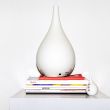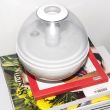As I’m writing this, my sinuses are stuffed. When I breathe, it’s painfully. As I sleep, I’m certain I sound like a gentle giant snoring. “Get a humidifier!” everyone keeps telling me, chalking up my afflictions to winter’s dry air. Only, do I really need a humidifier? Would it even help? I wonder. Leave it to necessity to lead me to journalistic inquiry and to Dr. Richard Lebowitz: an Otolaryngologist (Ear, nose, and throat doctor in laymen’s terms) and associate professor at NYU Langone Medical Center, to address my queries.
'It’s kind of an old wives’ tale!” Dr. Lebowitz says of the humidifier's power to work preemptively against winter maladies. However, he adds that “the nose is sort of the first line of defense against the bacteria, viruses, and funguses that we breathe in, so the better the nose works, the better off you are!” Doctors will recommend humidifiers to alleviate nasal complaints associated with dry, winter air like congestion, dryness, and nose bleeds, making breathing and sleeping—i.e. your life—more comfortable.
While humidifiers can also replenish moisture to the skin, dermatologist Carla J. Nip-Sakamoto, M.D., explains that as soon as you leave the humidified environment, the dry, ambient air will evaporate most of that moisture. She recommends moisturizing before leaving the humidified space (a hot, steamy shower room counts, too) to seal in some of the benefits.
Nose and skin benefits aside, humidifiers are often unsightly bedroom companions. Instead, try the Stadler Form Oskar Evaporative Humidifier. So streamlined and angular, it could be mistaken for an Apple speaker. Or, the pearlescent, teardrop shaped Objecto H4 Hybrid Humidifier with added aromatherapy capability. Just be sure to change the water and filter frequently to avoid mold growth (though chances of this are small) and as general, good hygienic protocol. So, let’s hear it for humidifiers. Keeping us, if not from sickness, from irritated nasal passages and flaky skin.
—Alexis Cheung
The Objecto H4 Hybrid Humidifier photographed by Tom Newton.




